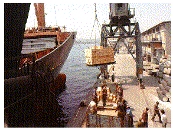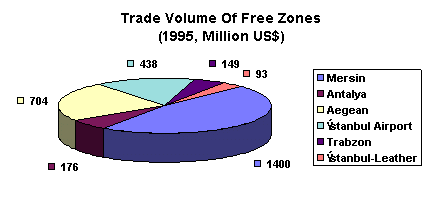 Free
Zones are defined as special regions within the country that are
deemed to be outside of the customs border and where the valid
regulations related to foreign trade and other financial and
economic areas are either not applicable, are partly applicable or
in which new regulations are tested. Free Zones are also the regions
where a more convenient business climate is provided in order to
increase trade volume and export for certain industrial and
commercial activities as compared to other parts of country. Free
Zones are defined as special regions within the country that are
deemed to be outside of the customs border and where the valid
regulations related to foreign trade and other financial and
economic areas are either not applicable, are partly applicable or
in which new regulations are tested. Free Zones are also the regions
where a more convenient business climate is provided in order to
increase trade volume and export for certain industrial and
commercial activities as compared to other parts of country.
Free Zones Law numbered 3218 was
issued in 1985 with the objective of increasing export-oriented
investment and production in Turkey, accelerating the entry of
foreign capital and technology, procuring inputs into the economy in
an economic and orderly fashion and increasing the utilization of
external finance and trade possibilities.
Free Zones Law No. 3218 was put into
effect in 1985 and since then the Mersin and Antalya Free Zones
became operational in 1988, the Aegean and Istanbul Ataturk Airport
Free Zones in 1990, the Trabzon Free Zone in 1992, the
Istanbul-Leather Free Zone in 1995 and commercial activities have
been conducted in the Mardin and Eastern Anatolian Free Zones since
October, 1995.
On the other hand , a new
implementation, the Istanbul International Stock Exchange Free Zone
which is expected to commence its activities in the second half of
1996 and whose main objective is to create an international finance
center, will operate in the field of stock purchasing-selling, stock
barter, maintenance and in the field of other transactions within
the body of Istanbul Stock Exchange, one of the most intensive stock
exchange in this region of the world that foreigners carry out their
transactions when it become operational.
The 15th International Conference of
Free Zones and Export Processing Zones and the 8th General Assembly
Meeting was held between October 8 and 11, 1995 in Rio de Janeiro,
Brazil by the World Export Processing Zones Association (WEPZA)
which the General Directorate of Free Zones (Undersecretariat for
Foreign Trade) has been a member since 1991. During the 8th General
Assembly Meeting, held with the participation of 32 countries,
Turkeys representative, the Director of the General Directorate of
Free Zones was elected unanimously by the members of the General
Assembly for 4 years to the membership of the WEPZA Council, which
is the highest body of WEPZA.
Moreover, it was decided that the
17th International Conference of Free Zones and Export Processing
Zones and the 9th General Assembly were to be held in Istanbul,
Turkey in 1997.
In addition, the General Directorate
of Free Zones assists at project and technical levels in studies on
the establishment of free zones in the countrys region and provides
the necessary documentation for their legal arrangements.
Turkish Free Zones, as far as their
legislation, infrastructure and volume of trade are concerned,
provide a good example in our region. In this context, technical and
project assistance have been given to the countries in the region to
help to establish their free zones. A joint protocol was been signed
between the Turkish and Georgian Governments on October 31, 1995 in
Tbilisi to carry out technical and feasibility studies to establish
the Georgian Free Zones and also to prepare the required legislation
for this purpose.
As of the end of 1995 the trade
volume of the five operational free zones amounted $1,400 million US
in the Mersin Free Zone, $176 million US in the Antalya Free Zone,
$704 million US in the Aegean Free Zone, $438 million US in the
Istanbul Ataturk Airport Free Zone and $149 million US in the
Trabzon Free Zone and $93 million US in the Istanbul-Leather Free
Zone and reached $2,960 million US, showing an increase of 51
percent as compared to 1994.

Source: General Directorate of Free
Zones
Currently, there are 951 firms in the
Turkish Free Zones of which 178 are foreign and 773 are local. These
zones employ approximately 6000 personnel.
When the breakdown of volume of trade
by countries as of the end 1995 is evaluated, it is seen that the
volume of trade realized with EU countries was 15 percent, with the
other OECD countries 6 percent, with the other European countries 2
percent, with CIS countries 13 percent, with the Middle East
Countries 4 percent, with the other countries 1 percent and with
Turkey 50 percent.
In 1995, free zones exports to Turkey
reached $545.5 million US which constitutes 21 percent of the free
zones' total volume of trade. On the other hand, free zones imports
from Turkey was $969 million US, representing 34 percent of the free
zones' total volume of trade.
As of the end of 1995 industrial
products constituted 74%, agricultural and livestock products 23%
and mining products 3% of free zones' trade volume.
When the sectoral breakdown of volume
of trade is studied, industrial products are seen to be made up of
textiles and garment products with $884 million US, machinery
industry products with $227 million US, motor vehicles with $201
million US, electric-electronic and optical products with $192
million US, chemical products with $184 million US respectively.
In general, a great variety of
activities can be performed in Turkish Free Zones such as
manufacturing, storing, packing, general trading, banking and
insurance. Investors are free to construct their own premises, while
zones also have available office spaces, workshops, or warehouses on
a rental basis at attractive terms. All fields of activities open to
the Turkish private sector are also open to joint-venture or foreign
companies.
I- Mersin Free Zone
Adjacent to Mersin Port, the Mersin
Free Zone has been established on 776.000 square meters of public
estate. Commercial activities have been conducted since the
beginning of 1988 and the zone is operated by MESBAS-Mersin Free
Zone Operator Inc.
As of the end of 1995 the volume of
trade realized by zone users reached $1,400 million US which shows
an increase of 51% compared to 1994.
There are 376 licenced firms in the
zone of which 72 are foreign. 219 firms are operating in the field
of purchasing and selling while 29 firms are in the field of
production, 49 firms storing, 50 firms leasing and others are in the
field of banking, insurance and repair-maintenance.
II. Antalya Free Zone
Adjacent to Antalya Port, the Antalya
Free Zone encompasses an area of 536,740 square meters of public
property. A customs corridor was established between the zone and
the port and thereby the connection of the zone with the port was
assured. Commercial activities in the Antalya Free Zone have
commenced in 1988 and ASBAS, a private firm, performs as the zone
operator company.
As of the end of 1995 the volume of
trade realized by zone users reached $176 million US which shows an
increase of 98% as compared to the volume of trade realized in 1994.
A total of 95 firms, of which 14 are
foreign, hold free zone operating licences. 42 firms are operating
in the field of purchasing and selling while 13 firms are in
production, 15 firms leasing, 9 firms banking and insurance, 7 firms
storing and the rest are in the fields of assembling-disassembling
and repair-maintenance.
III. Aegean Free Zone
Just 4 kilometers away from the Adnan
Menderes International Airport and 14 kilometers away from the Izmir
Port, the Aegean Free Zone covers an area of 2.2 square kilometers
of public estate. The zone is basically designed for hi-tech
industries and commercial activities partly commenced in 1990. The
founder-operator company of the zone, ESBAS has a foreign share of
96.4%.
As of the end of 1995 the volume of
trade realized by zone users reached $704 million US which shows an
increase of 55 as compared to 1994.
A total of 241 firms, of which 58 are
foreign, hold free zone operating licences. 166 firms are operating
in the field of purchasing and selling while 44 firms are in
production, 4 firms leasing and 5 firms banking-insurance and the
rest in storing, assembling and repair-maintenance.
IV. Istanbul Ataturk Airport
Free Zone
The Istanbul Ataturk Airport Free
Zone has two sections; the first one provides 33 premises and has
been in operation since 1990, while the second one, which became
operational in 1991 offers 57 premises. Since there is no operating
company for the zone, services are provided by the Zone Directorate
through contracted firms. A total of 98 firms, of which 13 are
foreign, hold free zone operating licences.
As of the end of 1995 the volume of
trade realized by zone users reached $438 million US which shows a
decrease of 2% as compared to 1994.
V. Trabzon Free Zone
Commercial activities in the zone
have been underway since June 4, 1992. The founder-operator company
of the zone, TRANSBAS and has a foreign share of 94%. TRANSBAS has
rented an area of 44,692 square meters in Trabzon Harbour.
As of the end of 1995 the volume of
trade realized by zone users reached $149 million US which shows an
increase of 237% as compared to the volume of trade realized in
1994.
Three are 30 licenced firms in the
Zone of which 9 are foreign. One firm has an establisher licence, 25
firms hold purchasing and selling operating licences while the rest
storing, banking, insurance operating licences and the others
storing, banking, insurance operating licences.
VI. Istanbul Leather Free
Zone
The zone has been established on
88,000 square meters of private estate by the Founder-Operator
Company, DESBAS. Free zone applications for operating licences have
been accepted since June 20, 1994 and commercial activities started
in March 1995. There are 111 firms, of which 7 are foreign, that
hold free zone operating licenses. As of the end of 1995 the volume
of trade by zone users reached $93 million US.
Though the Istanbul Leather Free Zone
was intended to specialize in leather products, other fields of
activity can be carried out by zone users.
VII. Erzurum -Eastern
Anatolian and Mardin Free Zones
Additionally, the establishment of
the Erzurum-Eastern Anatolian and Mardin Free Zones are envisaged
within the framework of the measures taken for the development of
Eastern and Southeastern Anatolia. In this context decree of the
Council of Ministers No. 94/6028 which determines the location and
boundaries of the Erzurum-Eastern Anatolia and Mardin Free Zones,
was issued in the Official Gazette No.22069 dated 2.10.1994 . These
two new free zones were put into operation in November 1995.
|

